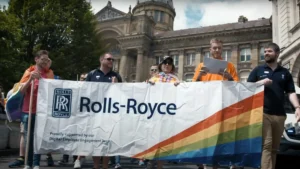Rolls-Royce has become the latest major UK-headquartered company to pull back from diversity, equity, and inclusion (DEI) initiatives, citing the need to comply with anti-DEI legislation in the United States — a move influenced by growing pressure from President Trump’s White House.
The FTSE 100 aerospace and defence group, which employs 43,000 staff globally, has informed employees that it will cut funding and internal support for its employee inclusion networks, such as Prism, its LGBTQ+ group. While employees can continue to meet informally, the groups will no longer receive corporate backing, have a presence on the company intranet, or be allowed to promote events within company premises.
The changes were communicated last month by Natasha Whitehurst, head of diversity, inclusion and belonging, and Adam Riddle, head of North America operations. They also confirmed the launch of a new “employee voice network”, open to all employees and designed to replace identity-specific groups.
Rolls-Royce said the decision was taken to ensure compliance with recently introduced anti-DEI legislation in the US, where 6,000 employees and a third of the company’s £19 billion revenues are based. The company holds major defence contracts with the US government, including engine production for military aircraft such as the C-130 Hercules and B-52 bomber fleets.
In a statement, a Rolls-Royce spokesperson said: “We support all our colleagues to be at their best, ensuring we live by our behaviours and drive a culture of high performance and engagement. We regularly review our policies and approach to ensure we achieve this outcome, while complying with all legal requirements in the jurisdictions in which we operate.”
References to DEI and the inclusion networks have since been removed from Rolls-Royce’s corporate website.
Rolls-Royce is not alone in its course correction. Other UK multinationals with significant US footprints have similarly scaled back their DEI visibility in recent months. GSK has removed references to “diversity” from its website, while WPP, the advertising group, excluded DEI language from its annual reports and executive compensation criteria.
The rollback comes amid a wider backlash against corporate DEI policies in the US, with Trump’s administration targeting what it sees as politically motivated corporate initiatives. Several Republican-led states have introduced laws to ban or restrict diversity programmes in publicly funded institutions and in companies that contract with the government.
The decision marks a stark contrast to previous messaging from Rolls-Royce’s leadership. Last year, CEO Tufan Erginbilgic praised the inclusion networks as a “powerful way” to foster a sense of belonging across the company.
“As volunteers from every part of our business — from the shop floor to senior leadership — they are role models who bring us together and help us learn,” he said in 2024.
Despite this shift, Rolls-Royce insists that merit-based hiring remains central to its culture. However, the global imposition of US compliance standards — even in countries where DEI programmes remain encouraged — has drawn criticism from campaigners and employees alike.
With DEI under growing political scrutiny in both the US and UK, the future of corporate inclusion efforts may increasingly hinge on balancing internal culture with external pressures — and navigating the legal grey zones in between.
